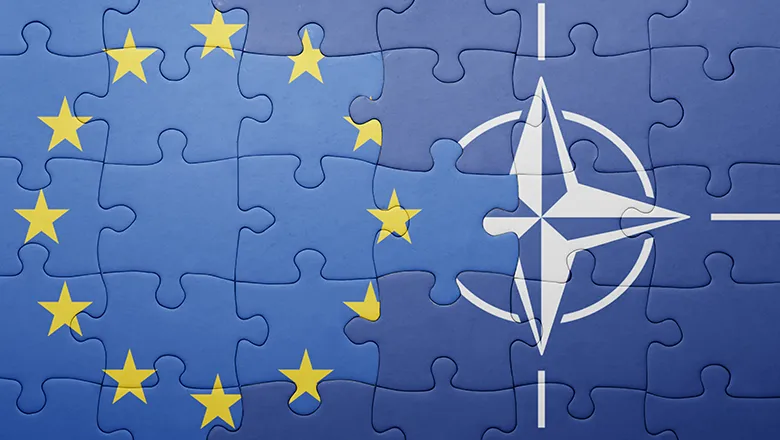08 April 2019
Why EU-NATO cooperation has proved so difficult
Peter Ricketts
PETER RICKETTS: Sensitivity is required in managing the relationship

When I served as the UK’s Permanent Representative to NATO in the mid-2000s, the event that none of us members of the North Atlantic Council liked to find on our list of meetings for the day was a “NAC/PSC”. It was not that we disliked our colleagues from the other side of Brussels who sat on the EU’s Political and Security Committee, it was just that these joint NAC/PSC meetings were often very boring.
How come these two great Western institutions found it so difficult to work with each other that the only issue they were allowed to discuss collectively was the peacekeeping operation in Bosnia, which passed from NATO to the EU in late 2004? The story is a tangled one, with its roots in the immediate post-war world. As the NATO treaty was being signed in 1949, some European statesmen were planning to take European integration beyond the six-member Coal and Steel Community agreed in 1951, and build a European Defence Community (EDC) as well. Indeed, the same countries did sign an EDC treaty in 1952 setting up a European army, but the French National Assembly refused to ratify it.
The failure of the EDC meant that throughout the Cold War the European Community steered well away from defence matters. When I served in NATO in the 1970s, there was no European caucus, and no contact with the other end of Brussels. It was only after 1989 that the Maastricht treaty framed the goal of “a common foreign and security policy, including the eventual framing of a common defence policy”. The EU’s involvement in foreign and security policy has grown enormously since then, but European defence and the relationship with NATO has remained sensitive territory.
The term “European defence” itself was always open to different interpretations. The French led one camp in the EU favouring a genuine European defence capability independent of NATO (and therefore a hedge against a loss of US interest in Europe’s security). The British led the other camp determined to ensure that NATO remained responsible for the collective defence of Europe. Tony Blair and Jacques Chirac reconciled these positions in their St Malo agreement in 1998, where Blair accepted that the EU should develop its own defence capabilities, and Chirac agreed that this should not compete with NATO (and therefore by implication not take on the most demanding military tasks).
That was the foundation for all the current EU defence structures, including the elaborate arrangements for the EU to borrow planning and military command assets from the NATO structure to conduct EU-led military missions, so as not to have to duplicate them. In fact, these have only ever been used in the EU Operation Althea in Bosnia.
Which brings us back to why EU-NATO cooperation has proved so difficult. This is largely because it became tangled up in the mutual suspicion between Greece and Turkey and the vexed issue of Cyprus. As the EU military structures took shape after 1998, Turkey sought the right to participate in EU operations and was clearly worried that the EU might decide to use its new-found capabilities to Turkey’s detriment in some way. Greece was determined that Turkey should not enjoy a privileged position in EU military arrangements, especially given its occupation of northern Cyprus. I was part of the effort to negotiate reassurances for both sides, including a document which actually spelt out that neither EU or NATO intended to attack members of either organisation! However, the interlocking controls which Turkey and Greece (and Cyprus when it joined the EU) held on EU-NATO cooperation ensured that for many years there were no useful exchanges on any issue other than Bosnia. Hence our lack of enthusiasm for NAC/PSCs.
Things have improved a lot since then. The 2018 NATO summit declaration assured us that tangible results had been achieved, including in countering hybrid threats, cyber security and defence, cooperation in the Mediterranean against migrant smuggling, defence capabilities, defence industry and research and facilitating military mobility within Europe. A joint declaration from Messers Stoltenberg, Juncker and Tusk confirmed that military capabilities developed through EU and NATO initiatives should remain available to both organisations.
So the spirit of St Malo lives on. But there are clouds on the horizon. President Macron and Chancellor Merkel, in frustration at President Trump’s transactional approach to NATO, are calling for European strategic autonomy and even a European army – although the EDC experience should have warned them that applying the techniques of economic integration to this ultimate symbol of national sovereignty will not work.
At a time when US national security interests are turning away from Europe and towards great power competition with China, European members of NATO should be doing all they can to maintain the vitality of NATO. Suggesting that Europe wants to stand alone on defence when European countries cannot begin to substitute for the vital military assets which the US brings to collective defence might even encourage a fracture at the heart of the alliance, especially if it was accompanied by protectionist measures on EU defence procurement.
The message from the last 70 years is that NATO and the EU can be compatible and indeed complementary, but that it requires continuing sensitivity to the views and interests of all participants. I like to think that Britain contributed to this as a key member of both organisations. I worry that Britain leaving the EU will remove an important link in the structure of EU-NATO cooperation.
Peter Ricketts is former Permanent Under-Secretary at the Foreign Office and former Permanent Representative to NATO.
